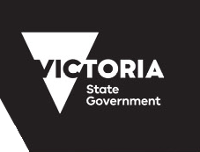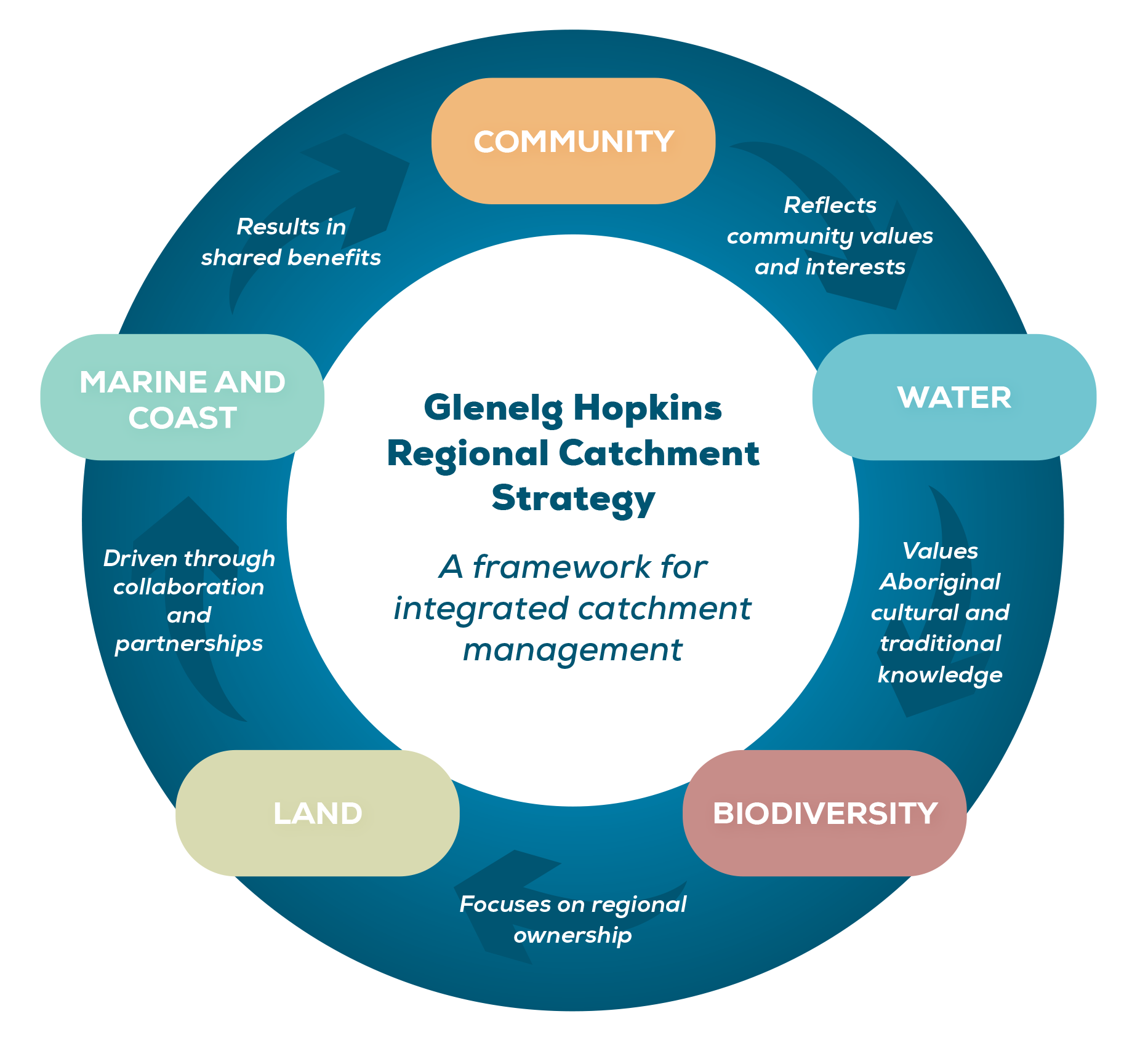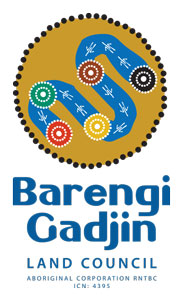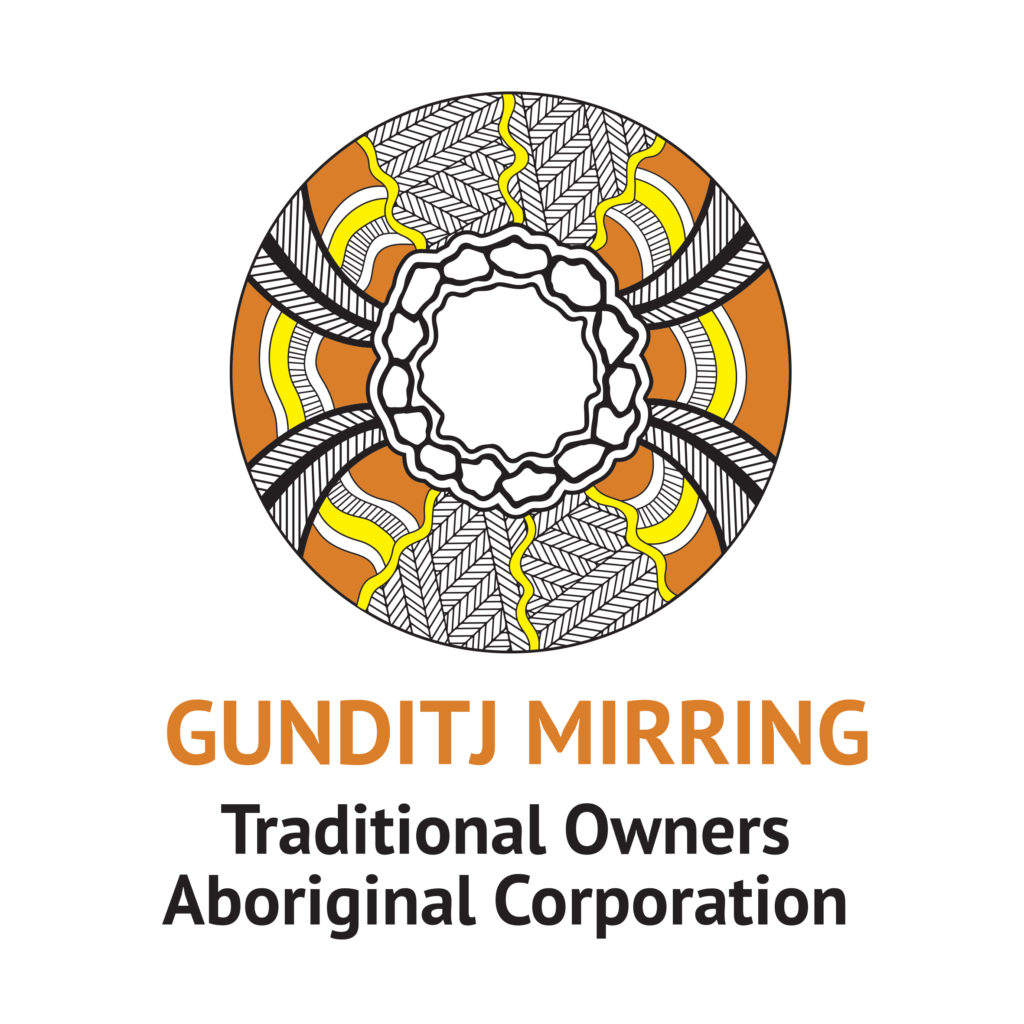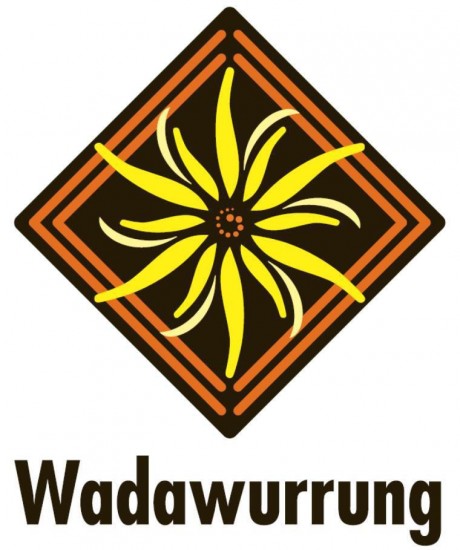Together we share both the problems and the solutions
The Glenelg Hopkins Regional Catchment Strategy (RCS) is developed to provide a regional focus and coordinated investment approach for addressing Integrated Catchment Management (ICM) challenges and opportunities. It captures the values and priorities of the community and brings together key partners who are critical to its implementation. Partners help share knowledge, leverage investment and resources, provide leadership and help engage the broader community in ICM.
Glenelg Hopkins CMA leads and manages the development of the RCS, but it is partnerships with community, individuals and organisations within the region that are the foundation for effective delivery of the RCS. The RCS outlines a commitment to partnership and collaborative effort that encourages and supports the participation of the community, landholders and resource managers in land protection and catchment management. Key partners involved in the delivery of the Glenelg Hopkins RCS are detailed below.
Traditional Owner and Aboriginal community organisations
Traditional Owners have rights and interests in the ownership and management of Country, including the protection of cultural heritage values, integration of cultural practices and knowledge, and cultural strengthening. They also own and co-manage land across the region.
Traditional Owner groups within south-west Victoria who help manage the unique cultural landscape of the Glenelg Hopkins region include Barengi Gadjin Land Council, Eastern Maar Aboriginal Corporation, Gunditj Mirring Traditional Owners Aboriginal Corporation and Wadawurrung Traditional Owners Aboriginal Corporation.
Within the catchment there are also local Aboriginal organisations which deliver a range of health and wellbeing, social, educational, and economic and community development programs for community members – including Winda-Mara Aboriginal Corporation, Burrandies Aboriginal Corporation, Framlingham Aboriginal Trust and Worn Gundidj Aboriginal Co-operative.
We recognise the diversity in Aboriginal representation across the region and are committed to building relationships and supporting partnerships with Traditional Owners and the broader Aboriginal community where there is an interest in ICM.
A partnership agreement between Gunditj Mirring Traditional Owners and Glenelg Hopkins CMA outlines the commitment of both organisations to continue their long-standing partnership with the aim of a more sustainable and resilient future for the health of people and country.
Agricultural industry groups
Agricultural industry groups support sustainable agricultural practices, research, capacity building and knowledge sharing across the region. They may also lobby on behalf of their respective industries to influence government policy.
Food & Fibre – Great South Coast
The Great South Coast Food and Fibre Council is the representative body for food and fibre in the Great South Coast and aims to realise the region’s untapped capacity to increase food and fibre production and value-add to build the viability and resilience of our local communities. Food & Fibre GSC champion food and fibre as the pathway for ongoing prosperity and wellbeing of Great South Coast communities. Glenelg Hopkins CMA and Food & Fibre GSC are fostering a relationship to better support the regions food and fibre community.
Grasslands Society of Southern Australia (GSoSA)
The GSoSA is the peak farmer organisation dedicated to the transfer of information and technology related to temperate grasslands. GSoSA partner with Glenelg Hopkins CMA to deliver relevant extension and demonstration activities in the region.
Meat and Livestock Australia (MLA)
MLA’s purpose is to foster the long-term prosperity of the Australian red meat and livestock industry by investing in research development and adoption projects to increase the productivity and profitability of Australia’s cattle, sheep and goat businesses. MLA works to support farmers in the Glenelg Hopkins region to have access to innovative research and extension material.
Perennial Pasture Systems (PPS)
Since PPS was formed in mid-2007, 159 farm businesses across Central Victoria and the Southern Wimmera have joined the group. PPS members are heavily involved in prime lamb & mutton production. PPS also has 30 members involved in agribusiness and agronomic services. The group aims to push the boundaries of perennial pasture research in our area and provide information on productive pasture management to members. PPS has strong working associations with Glenelg Hopkins CMA.
Southern Farming Systems (SFS)
SFS is a farm-driven, non-profit organisation helping higher rainfall farmers with practical research and information that produces sustainable results. Across the Glenelg Hopkins region, SFS is a lead partner in projects related to smart farming technologies and future drought resilience. It is also a partner with Glenelg Hopkins CMA in the delivery of a broad range of sustainable agriculture activities, including training and capacity building events.
WestVic Dairy
WestVic Dairy is a regional team set up by Dairy Australia in the 1990s to deliver dairy extension activities and programs. WestVic Dairy works to its strategic priorities of supporting profitable dairy farms, building capable industry people, encouraging two-way communication and engagement and promoting a trusted and valuable industry. WestVic Dairy supports farmers in the Glenelg Hopkins region to manage their business including on-farm nutrient and fertiliser management, soil health and training and capacity building events.
Australian Government
Department of Agriculture, Water and the Environment (DAWE)
DAWE‘s purpose is partnering and regulating to enhance Australia’s agriculture, unique environment and heritage, and water resources. The department has five key focus areas:
- Support stewardship and sustainable management to enhance Australia’s environment and our unique heritage
- Manage biosecurity risks to Australian agriculture, the environment and our way of life
- Advance Australia’s strategic, scientific and environmental interests in the Antarctic and the Southern Ocean
- Support the sustainable management and productive use of Australia’s water resources, and
- Assist industry to grow to a $100 billion agriculture sector by 2030
DAWE administers the Environment Protection and Biodiversity Conservation Act 1999 Act to protect and manage important flora, fauna, ecological communities and heritage places. Within the Glenelg Hopkins region it also supports RCS delivery through National Landcare Program investment in biodiversity, community and sustainable agriculture priority outcomes.
Industry and business
AGL
AGL is a leading integrated essential service provider, with a 184-year history of innovation and a passionate belief in human and technological progress. A formal agreement between AGL and Glenelg Hopkins CMA is in place to support local communities and the environment in the south-eastern Grampians region of the catchment, including investment in wetland restoration and salinity remediation.
Forestry
Forestry companies in the region help maintain and improve high conservation value forest within and adjacent to their estates. They also form regional partnerships with agencies and not-for profits to support this work, including projects such as red-tailed black cockatoo habitat improvement. Larger companies operating within the Glenelg Hopkins region include Australian Bluegum Plantations (ABP), Green Triangle Forest Products (GTFP), Hancock Victorian Plantations (HVP), OneFortyOne, PF Olsen Australia, SFM Forest Products and Timberlands Pacific. New Forests has an MoU with Glenelg Hopkins CMA to support the implementation of the RCS to improve ecosystem resilience in a changing climate over plantation forests and land managed by New Forests. This MoU includes land being managed by ABP, Timberlands Pacific and SFM on behalf of New Forests.
Land owners, community and recreation groups
Committees of management
Committees of management are appointed under the Crown Land (Reserves) Act 1978 to manage their reserve on behalf of the Minister for Environment and Climate Change. They have the responsibility to manage crown land reserves across the region.
Land owners and managers
Land owners and managers have responsibilities under the Catchment and Land Protection Act 1994 to avoid causing or contributing to land degradation. Responsibilities include conserving soil, protecting water resources, eradicating regionally prohibited weeds, preventing the growth of regionally controlled weeds and preventing the spread of (or eradicating where possible) established pest animals. Engagement and strong relationships with land owners and managers is key to the successful delivery of the RCS.
Landcare and friends of groups
Landcare and friends of groups participate in specific area planning and on-ground works, across both public and private lands, mostly on a volunteer basis. It is important that community groups are supported to be involved in initiatives to improve the health of the region. The Glenelg Hopkins region’s Landcare program has been operating for 32 years and currently has five Landcare networks and 108 Landcare Groups. There are a further 49 community-based natural resource management groups active in the region. Access the Victorian Landcare Gateway to find out more about groups in the region, and across the state.
Recreational and angling groups
Recreational and angling groups use the region’s natural resources and can help in their management. For example, angler engagement can support improvements in waterway and riparian health through revegetation and in-stream habitat works. Members of the South West Victorian Chapter of OZFish are like-minded fishers who believe in the benefit of enhancing fish habitat to improve local fish populations.
Local Government Authorities
Local Government Authorities (LGAs) are key partners that influence integrated catchment management through their responsibilities for land-use planning, development approvals and maintenance activities. Some LGAs have been involved with the development of environmental plans including roadside management plans and pest plant and animal strategies. LGAs also contribute to integrated catchment management through their Council Plans and 2040 community plans, which outline community education and engagement outcomes, as well as on-ground works that support improved environmental health and wellbeing outcomes.
There are 11 LGAs within the Glenelg Hopkins region:
Non-government organisations
Non-government organisations (NGOs) play an important role in integrated catchment management across the Glenelg Hopkins region, as funding and delivery partners.
BirdLife Australia
BirdLife Australia is the nation’s largest bird conservation organisation. It is an independent, not-for-profit organisation working to achieve beneficial results for a wide range of bird species. BirdLife is a key partner in delivering conservation works to protect endangered bird species across the Glenelg region, including the red-tailed black cockatoo and hooded plover.
Greening Australia
Greening Australia is an Australian environmental organisation founded in 1982, the International Year of the Tree, to protect, restore and conserve Australia’s native vegetation. Greening Australia was formed by the United Nations Association of Australia and the Nursery Industry Association of Australia. Within the Glenelg Hopkins region, Greening Australia works to support revegation works on both private and public lands.
Nature Glenelg Trust (NGT)
NGT is a not-for-profit environmental organisation in south-eastern Australia, established and operated by a group of dedicated, professional ecologists who are passionate about getting results for our local communities. Nature Glenelg Trust believes in positive action and leading by example in on-ground and other project work to benefit the regional environment and community. NGT has a keen interest in wetland conservation and restoration activities with great success in the restoration of Long Swamp and Walker Swamp within the Glenelg Hopkins region. A partnership agreement between NGT and Glenelg Hopkins CMA outlines the strong working history of the two organisations and their commitment to supporting improved environmental outcomes across south west Victoria.
Odonata
Odonata is a not-for-profit entity supporting biodiversity impact solutions. Founded in 2017 Odonata helps create, support, nurture and empower businesses and entrepreneurs to move towards a more environmentally sustainable world.
In partnership with the Tiverton Agricultural Impact Fund, Odonata is involved in the management of Tiverton, the first remnant-vegetation-only farm to operate sheep grazing in a comprehensive and master-planned model on Volcanic Plains Grassland. It is also involved in the management and reintroduction of threatened species, including the eastern barred bandicoot.
Zoos Victoria
Zoos Victoria is a world-leading zoo-based conservation organisation dedicated to fighting wildlife extinction. Its important work includes breeding and recovery programs supported by partnerships with local communities, conservationists and like-minded organisations.
Victorian Government, agencies and statutory authorities
Agriculture Victoria (AgVic)
AgVic works in partnership with farmers, industries, communities and other government agencies to grow and secure agriculture in Victoria. The department also undertakes key roles across agriculture sectors in Victoria, either directly through statutory agencies or with partner agencies across the Victorian Government. The department administers various pieces of legislation that support these activities. AgVic is a partner in the delivery of sustainable agriculture activities across the region.
Department of Environment, Land, Water and Planning (DELWP)
DELWP develops and implements statewide policies for integrated catchment management, water, climate change and biodiversity conservation (see policy context). It also provides investment to support delivery of priority outcomes in these areas by working in partnership with Traditional Owner groups, CMAs and other agencies and authorities, including the development of Regional Catchment Strategies. DELWP manages public land across the catchment.
Environment Protection Authority (EPA)
EPA has the primary role to protect air, water and land from pollution, control industrial noise and minimise waste generation through the administration of environmental protection policies. Relevant to waterways, the SEPP (Waters) has provided for the protection and management of surface water and groundwater in Victoria by establishing the uses and environmental values to be protected, defining the level of environmental quality required for their protection, and setting rules and obligations to ensure management actions are taken to protect water quality.
Glenelg Hopkins Catchment Management Authority (CMA)
Glenelg Hopkins CMA was established by the State Government of Victoria in 1997 to manage land and water resources in the south-west region of Victoria, Australia. The CMA’s aim is to inspire partnerships with the people and groups that use the land and water in the region, driving action to achieve improved catchment and land health. Glenelg Hopkins CMA also leads the development and implementation of the RCS. It engages with the broader community in on-ground delivery of integrated catchment management, and sources investment for RCS implementation from a range of partners and agencies.
Great Ocean Road Coast and Parks Authority
The Authority’s primary purpose is to protect and manage visitation of the Great Ocean Road Coast and Parks. It manages, protects, rehabilitates and fosters resilience of the natural, cultural and heritage values of coastal Crown land and marine waters along the Great Ocean Road.
Parks Victoria (PV)
Parks Victoria (PV) is a statutory authority established to protect, conserve and enhance Parks Victoria managed land, including its natural and cultural values, for the benefit of the environment and current and future generations consistent with the Parks Victoria Act 2018. The Glenelg Hopkins catchment includes 207,788 ha managed by PV. Its statewide Land Management Strategy (in prep) sets the direction for its land management, including nature conservation, cultural heritage management, and visitor management and services. PV works closely with Traditional Owners, other agencies and the community to continuously improve its capacity to deliver large-scale programs and on-ground actions to protect and manage the best of Victoria’s natural assets, throughout the Parks estate.
Southern Rural Water (SRW)
SRW is responsible for managing irrigation districts, the regulation of surface water and groundwater licensing, and storage dams across the southern third of Victoria. It operates across the Glenelg Hopkins catchment to provide irrigation, drainage, water supply and management of specific water supply catchments. It issues licences for surface and groundwater extractions.
Trust for Nature (TfN)
TfN works closely with private landowners, government, organisations, traditional landowners and businesses to help restore, protect and manage biodiversity on private land. It uses a variety of methods to achieve conservation goals across Victoria. On-title agreements, or Conservation Covenants, are used to protect private land in perpetuity. TfN also assists private landowners, businesses and organisations with a range of conservation services such as purchasing and planning, biodiversity mapping, planting, species monitoring, weed control and fencing.
Urban Water Corporations
Urban water corporations provide water and wastewater services to urban communities and management of specific water supply catchments. They must meet obligations issued by the Minister for Water under the Water Act, including preparing plans, community engagement processes, managing assets and safety and environmental management. Within the Glenelg Hopkins region, water corporations include Central Highlands Water, Grampians Wimmera Mallee Water and Wannon Water. Wannon Water and Glenelg Hopkins CMA have a formalised partnership that allows them to work together on future projects and ideas that will continue to strengthen the wellbeing of the region. This includes regional leadership, integrated water management, climate change, business excellence and joint advocacy.
VicRoads
VicRoads is a State Government agency that owns, manages and regulates the arterial road network, delivers road safety initiatives, and provides customer-focused registration and licensing services. Across the Glenelg Hopkins region it is actively involved in developing roadside management plans for major roads. These plans assist with managing roadside environments and consider pest plants and animals, retention of significant roadside areas, maintenance strategies and maintenance of firebreaks. An MoU between Vic Catchments and VicRoads also sets out a process for the use of cleared timber from roadworks to be used for in-stream fish habitat works.
Victorian Fisheries Authority (VFA)
The VFA is an independent statutory authority established to effectively manage Victoria’s fisheries resources. It works closely with many stakeholders to deliver three core outcomes:
- Sustainable fishing and aquaculture
- Clear resource access and sharing arrangements
- Increased economic, social and cultural value.
Victorian Environmental Water Holder (VEWH)
VEWH is an independent statutory body responsible for holding and managing Victoria’s environmental water entitlements. It works with catchment management authorities and Melbourne Water to ensure environmental water entitlements are used to achieve the best environmental outcomes with the water that is available. In the Glenelg Hopkins region VEWH provides investment and supports implementation of the Glenelg River Water for Environment program.
University and research institutions
Universities and research institutions support research and knowledge sharing, capacity building and training by filling in information gaps across the region. They also provide a role in supporting natural resource managers through student and staff involvement in regional initiatives.
Arthur Rylah Institute for Environmental Research (ARI)
ARI is a leading centre for applied ecological research, with an emphasis on flora, fauna and biodiversity issues. ARI’s main focus is on providing strategic research and management advice to answer key questions affecting ecologically sustainable land or water management and resource use policies. Projects ARI is involved in across the Glenelg Hopkins region include monitoring native grassland grazing and weed control for conservation and tracking eel migration.
Deakin University
Deakin University is one of Australia’s leading tertiary education providers. A memorandum of understanding (MoU) between Glenelg Hopkins CMA and Deakin University has formalised a partnership between the organisations to develop collaborative and cooperative projects – particularly relating to natural resource management across the region.
Federation University
The purpose of Federation University is to transform lives and enhance communities. The Centre for eResearch and Digital Innovation (CeRDI) operates within the Research and Innovation Portfolio at Federation University. Through applied research, commercial activities and community engagement, CeRDI promotes innovation through the application of new technologies. This includes partnering on the development of the South West Climate Change Portal, and Soil Health Knowledge database in the Glenelg Hopkins region.
Geosciences Australia
Geoscience Australia is Australia’s pre-eminent public sector geoscience organisation that uses science and technology to describe and understand the Earth for the benefit of Australia. Geoscience Australia has been investing in Digital Earth Australia (DEA), a world-class digital infrastructure that uses satellite data to detect detailed physical changes across Australia. It identifies soil and coastal erosion, crop growth, water quality and changes to cities and regions. This technology will be invaluable for regional NRM organisations to track changes at a landscape scale. A Heads of Agreement has been signed between Geoscience Australia and NRM Regions Australia which sets out a framework for collaboration.
La Trobe University
La Trobe is known for making a positive difference in the lives of its students, partners and communities. Across the Glenelg Hopkins region La Trobe University is a key partner involved in managing roadsides and reserves to protect critically endangered Natural Temperate Grasslands of the Victorian Volcanic Plain.
University of Melbourne
The University of Melbourne will lead the Victorian Drought Resilience Adoption and Innovation Hub to help farmers, agricultural businesses and communities become more resilient to the impacts of future droughts. Within the Glenelg Hopkins region, this will involve organisations including Southern Farming Systems, Deakin University, Federation University and Agriculture Victoria. Students from the University of Melbourne have also been involved in waterway research across the region.
